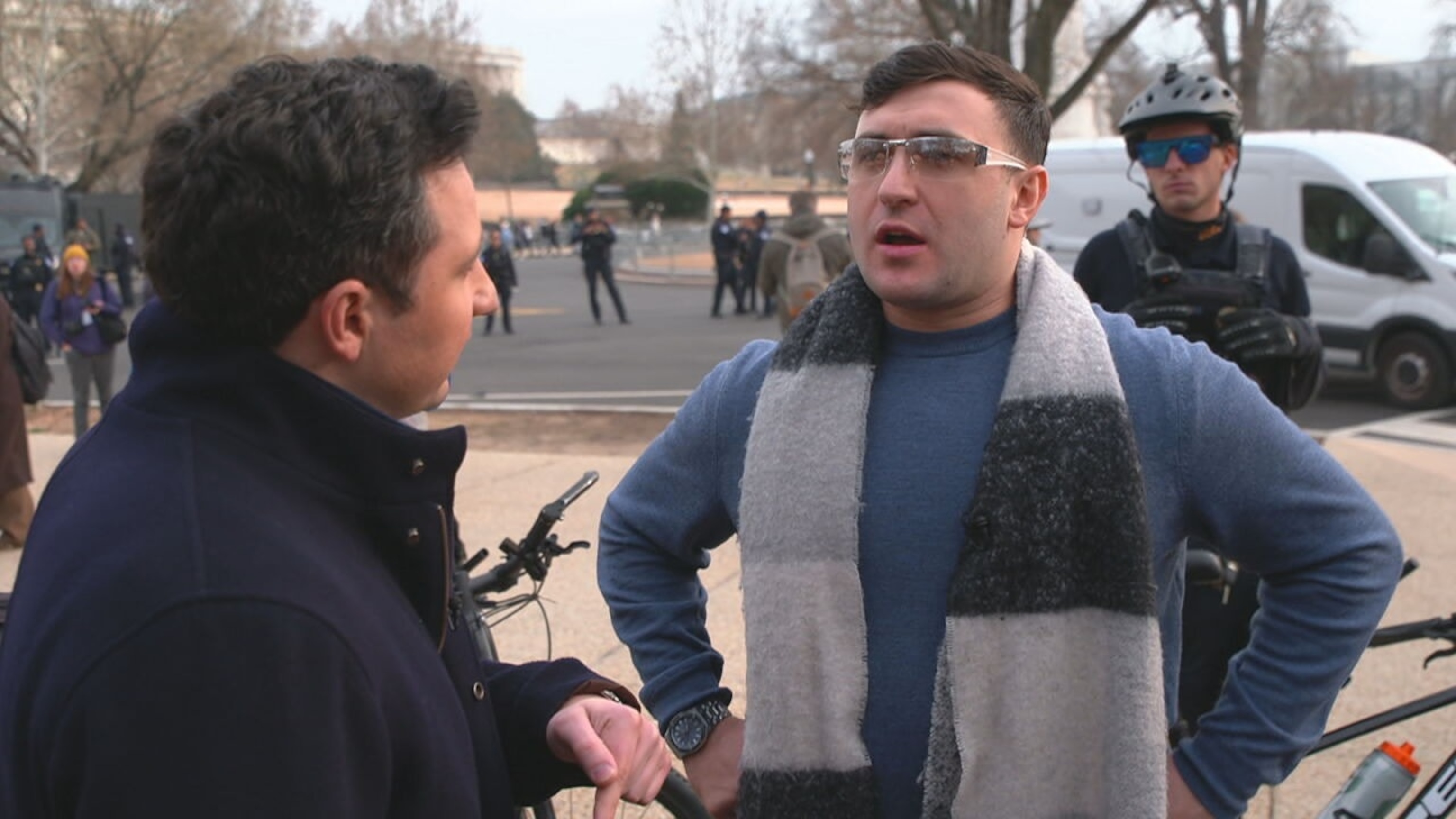Lawsuit challenging Texas abortion bans appears before state Supreme Court

The Texas Supreme Court heard arguments Tuesday in an ongoing lawsuit filed by women against the state over its multiple abortion bans. The suit, first filed by the Center for Reproductive Rights in March, was filed by women who say their lives were put in danger due to the state’s multiple bans.
Texas has several abortion laws in place prohibiting nearly all abortions, except in medical emergencies, which the laws do not define. Women filing the lawsuit say they were denied care despite having dangerous pregnancy complications.
One of the bans — called SB 8 — prohibits abortions after cardiac activity is detected, which generally occurs at around six weeks of pregnancy, keeping several plaintiffs from accessing care despite their pregnancies being nonviable, according to the suit.
The state Supreme Court will decide whether a partial block of Texas’ abortion bans — which would allow abortions to resume in cases of medical emergencies and fatal fetal diagnoses while litigation continues — can go into effect. The court did not issue a decision on Tuesday, as expected, but will issue a decision by June 2024, according to a CRR attorney.
Amanda Zurawski, Dr. Austin Dennard and Taylor Edwards prepare to enter the court room at the Texas Supreme Court in Austin, Texas, on Nov. 28, 2023.
Suzanne Cordeiro/AFP via Getty Images
After hearing emotional testimony from some of the women filing the suit, a lower court judge issued a ruling in August temporarily blocking the implementation of abortion bans in cases of medical emergencies and fatal fetal anomalies while the lawsuit continues. That ruling was quickly put on hold when state prosecutors filed an appeal.
The Texas Supreme Court will also issue a decision on state prosecutors’ request to throw out the case entirely. Judge Jessica Mangrum, the lower court judge who issued the injunction, had denied the state’s request to throw out the case.
The justices asked tough questions of both sides on Tuesday regarding their arguments on both the preliminary injunction and the lawsuit in its entirety.
The office of the attorney general, who appeared in court on behalf of the state, argued that the lower court’s ruling temporarily issuing the partial injunction on Texas’ bans was an overstep.
“The trial court overstepped its constitutional bounds with its ruling when it rewrote and expanded the medical emergency exceptions and then concluded that the expansion was constitutionally required,” said Beth Klusmann, the prosecutor who made arguments on behalf of the state.

Justice Debra Lehrmann, of the Texas Supreme Court, looks on as litigators make their arguments in Zurowski v. State of Texas, at the Texas Supreme Court in Austin, Texas, on Nov. 28, 2023.
Suzanne Cordeiro/AFP via Getty Images
The justices pushed the state repeatedly on its argument that the women filing the suit do not have standing to file the suit.
“Some of these women appear to have fallen within the exception but their doctors still said no. That’s not the fault of the law, that’s a decision of the doctor,” Klusmann said.
“If, as [the plaintiff’s attorney] said, a woman is bleeding or has amniotic fluid running down her legs, then the problem is not with the law, that is with the doctors. I mean, that woman, clearly, would qualify for the medical emergency exception and so if she has to come to court to make that happen, that’s not the state’s fault. What the legislature has done is chose to value unborn life and prohibit abortion in all circumstances unless that life is going to conflict with the life of the mother,” Klusmann said later in her arguments.
Justice Debra Lehrmann pressed the state on whether the law puts physicians providing health care in a “tough position.”
“No, Your Honor. I don’t think it does if they are allowed to use reasonable medical judgment, which is presumably a judgment they use when treating a patient in any given circumstance,” Klusmann said.
“The option is facing the legislature or you could either draw a line and allow [physicians] to use their reasonable medical judgment or you can do what the trial court did and essentially eliminate the line so that there really will never be a circumstance in which a woman is unable to obtain an abortion,” Klusmann said.
Klusmann argued that prior to Roe v. Wade being enacted, doctors used their medical judgment to perform abortions “when it was necessary.”
Molly Duane, the CRR’s attorney, who presented oral arguments Tuesday, said the laws have left physicians confused about what care they can provide.
“The abortion bans as they exist today subjected physicians like my clients to the most extreme penalties imaginable, life in prison and loss of their medical license. And while there is technically a medical exception to the bans, no one knows what it means, and the state won’t tell us,” Duane told the court.
Duane was asked by justices why the CRR did not file a suit claiming that the abortion bans are “unconstitutionally vague,” to which she responded that the CRR sought a “much more modest ask” of what the exception actually means.

In this July 20, 2023, file photo, Center for Reproductive Rights attorney Molly Duane speaks during a press conference outside the Travis County Courthouse in Austin, Texas. A Texas state court will hear arguments from both sides in Zurawski v. State of Texas, a lawsuit filed by the Center for Reproductive Rights on behalf of thirteen Texas women denied abortions despite serious pregnancy complications.
Suzanne Cordeiro/AFP via Getty Images, FILE
One of the justices pressed the state on doctors being provided more discretion when providing care before Roe v. Wade was enacted compared to the current the charged environment under which doctors are providing care with abortion being a “hot button issue.”
“I would say that the constitution does not change based on how people wish to enforce abortion laws. It means what it meant in 1876. And the discretion given in 1876, according to Texas statute, was on medical advice to save the life of the mother,” Klusmann said.
Do the plaintiffs have grounds to file the suit?
One of the arguments made by the state was that the plaintiffs — women who filed the suit on behalf of themselves and physicians who filed on behalf of themselves and their patients — do not have standing to file the suit.
Klusmann argued that the court’s general rules on standing are that it “cannot be a hypothetical or contingent claim. It needs to be certainly impending.”
“They are not seeking clarity for their own individual circumstances. They’re asking the court to declare that the law includes exacerbating maternal health conditions or a condition that makes a pregnancy unsafe or anything like that. That’s an advisory opinion. That’s not going to help them in any specific circumstance, because, again, the courts are just going to have to apply the language … in the future,” Klusmann said.
Duane argued that the plaintiffs have suffered the consequences of the ban and physicians brought by the state as experts testified that doctors are providing “substandard care” because of the laws’ lack of clarity.
“I think the law has been in effect and the effects are so crystal clear that we don’t need to guess at it. And I just want to point out right that we are not talking about hypothetical harms; these are real patients, many of whom are sitting in the courtroom today. And for example, Ms. [Amanda] Zurawski became septic while waiting to be sick enough to receive abortion care, and she had multiple surgeries to reconstruct her uterus, three days in the ICU and now her fertility is compromised,” Duane said.
“Physicians are waiting until the last minute because — as the state’s own expert testified — they are terrified they cannot risk a felony or life in prison,” Duane said later in her argument.
Asked whether the women who allege their lives were put at risk because of the ban would have qualified for care, Klusmann said it was a mix.
Patients who had premature rupture of membranes, or PROM, would “suffice in these circumstances” to meet the medical exception under the ban, but pregnancies where the child would not have “a sustained life” do not meet the exception, Klusmann said.

In this March 7, 2023, file photo, Lauren Miller, a plaintiff in the case, speaks on the lawn of the Texas State Capitol, in Austin, Texas.
Suzanne Cordeiro/AFP via Getty Images, FILE
A justice pressed the state on conditions like acrania, where a fetus develops without a skull, a fatal anomaly. Klusmann said that condition would not qualify for an abortion according to the exception.
“I think you do have to look to the legislature to create an exception for something that is solely a fatal fetal anomaly,” Klusmann said.
Responding to the CRR’s claim that their plaintiffs do not want to sue their physicians because they see that they did nothing wrong and that their hands were tied due to the abortion bans, Klusmann said, “That is their choice.”
What happens next?
If the Texas Supreme Court denies the state’s request to dismiss the case — in whole or in part — then the suit will return to district court for litigation.
“There is the possibility that the Texas Supreme Court will side with the state and rule that the only relief pregnant people in Texas have is to go ask their Texas legislators for a change. In that case, it wouldn’t return [the case to district court] and we have to pursue other avenues,” Nick Kabat, staff attorney with the CRR, told ABC News earlier this month.
This lawsuit, filed by the Center for Reproductive Rights, was first filed by five women in March. More women have since been added to the lawsuit. Of the 22 plaintiffs, 20 are women who say they have been impacted by the bans, and two others are physicians suing on behalf of themselves and their patients.
The lawsuit is asking the court to temporarily and permanently block Texas’ abortion bans due to uncertainty surrounding the meaning of the exceptions to the laws.
Source: abc news















